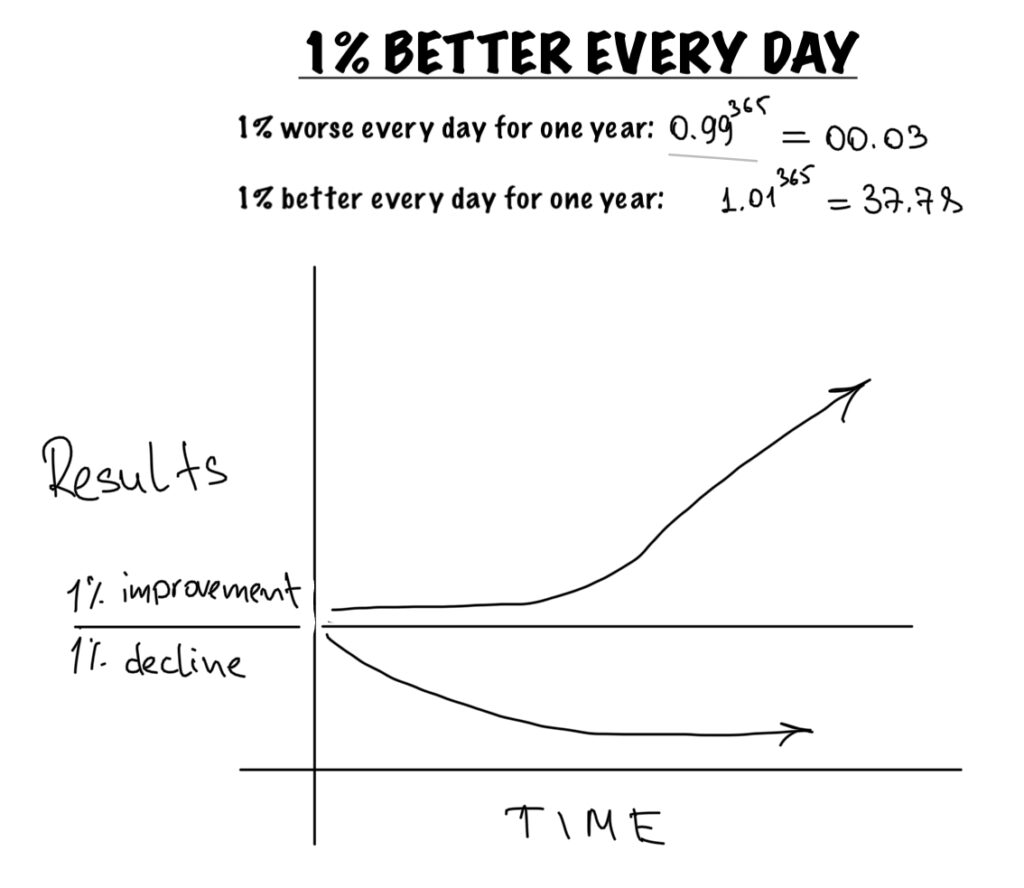Have you ever experienced that moment when you reflect on your life, your dreams, and your potential, and wonder, “Could I be doing more?” I certainly have.
In 2018, it was quite difficult to jump into working life after graduation. A series of setbacks made me question many things about myself. Something had to change, but it was hard to find what it was. One of the turning points in my life was a habit I instilled in myself at this very moment. I started writing down everything I read, saw, and found useful in a notebook. This habit has changed many things in my life, leading me to places I never imagined.
In this blog post, we’ll take a little trip into the wonderful world of habits and discover how a seemingly simple change on the surface can lead to a wave of big changes.
Why habits are important
Most likely, you want to make changes in your daily life: for example, stop procrastinating, exercise or learn something new. For this, you make a plan, gather your will and take action. But like most, you fail.
What happens?
Perhaps achieving your desired goal is more challenging than anticipated. But the truth is, change in our behaviour isn’t usually something we can control just by trying really hard. Instead, most people make changes by doing the same thing over and over again – that’s what we call habits.
What are the habits?
Habits are actions that happen repeatedly or without conscious effort. Think of them as signals that activate certain behaviours in specific situations or times of day. Essentially, your brain forms links between particular situations and actions, so you end up doing those actions almost automatically, without needing to think about it.
James Clear, in his book Atomic Habits, shares a powerful insight about the role of habits: “Success is the product of your daily habits.” Positive habits can be your allies in this journey. Similarly, habits may not appear significant until you reach a turning point and elevate your quality of life. James Clear explains this as “atoms of our lives.”
They are like the small, imperceptible routine processes that seem insignificant at first glance. Over time, these everyday rituals add up and create a snowball effect, leading to more substantial results. Think of it as an investment. Your habits quietly accumulate, and their impact multiplies, often far exceeding your initial efforts. They are the atoms that compose the beautiful mosaic of your life.
How to form habits?
When your mind is engaged in an enjoyable activity, it triggers the release of dopamine, which not only enhances your mood but also strengthens your connection to that activity. Take, for instance, one of the prevalent habits of our time – spending time on social media. The validation in the form of likes, comments, and interactions that accompany the content we share serves as a reward for our engagement. Each uptick in these numbers prompts a release of dopamine, encouraging us to continue the same behaviour and ultimately leading to the formation of a habit.
The process of habit formation unfolds through four distinct stages:
- Stimulus prompts the brain to initiate this or that behaviour.
- Desire is the main motivation factor behind any habit.
- Reactions are regular habits in which we behave, either in the form of thought or action, respectively.
- Reward completes the cycle of any habit formation.
In this sequence, the stimulus generates a craving that fuels our response, ultimately leading to a reward, which, over time, becomes closely associated with the initial stimulus.
How habits can shape and change us?
If you want to make changes in your life, you need to get this idea firmly in your mind: small changes lead to big results. Often, we overlook or underestimate the significance of these incremental shifts that occur in our day-to-day existence. This tendency stems from the misconception that significant achievements demand monumental efforts, leading individuals to place immense pressure on themselves in pursuit of grand success, often without any tangible progress towards their goals.
Consider this example: Many students adopt the approach of intense exam preparation in the final stages to secure high scores at university. Yet, embracing small, daily improvements, often referred to as the “1% improvement” approach, can propel us towards our long-term goals with greater efficiency and determination.

Over time, gradual adjustments can yield remarkable outcomes. Here’s the mechanics behind it: if you can make a 1% improvement in your abilities each day over the course of a year, you’ll find yourself 37 times more proficient at the end of the year compared to where you started.
The outcomes of this approach may not manifest immediately, as habits tend to evolve gradually over time. Past experiences of not achieving the desired results can be disheartening. However, consistently practising these habits will ultimately yield significant rewards, as habits are a continuous journey of self-improvement.
How to change?
Transformation starts with the formation of identity. Prior to embarking on change, it’s essential to define the type of person you aspire to become and the values you wish to embody. Reflect on these fundamental questions:
Indeed, answering these questions should be done with honesty and a realistic perspective. Nevertheless, the pivotal question to ask is this: Given all the dedicated efforts you’ve put in, will you ultimately become the person you aspire to be?
Shift your focus away from mere outcomes and concentrate on the essence of who you wish to become. Strive to embody the identity of a runner, not just completing a marathon. Aim to cultivate the identity of a devoted reader, rather than fixating solely on reading a specific number of books in a year. In essence, the identity you shape should undergo two crucial processes:
- You have to decide what kind of person you want to be.
- You have to prove to yourself that you are that person with the smallest successes you achieve in your life
Fundamentally, your habits should not be solely about acquiring possessions or achievements; they should revolve around personal transformation and character development. The underlying system governing everyone’s actions is structured accordingly. To cultivate habits and attain success, you must persistently engage in experimentation, acknowledge mistakes, learn from them, and then adapt your approach. As your experience grows, you’ll gradually phase out unproductive actions in favour of more beneficial ones. Subsequently, these habits will emerge, ultimately reshaping your life in profound ways.
Four steps to build better habits
Any new habit should take no more than 2 minutes. One of the most effective strategies for cultivating positive habits is to immerse yourself in an environment where the desired behaviours are commonplace. To catalyze change in your life, a single word can make all the difference: shift from “have to” to “can do.”
The crucial takeaway here is that both versions, “have to” and “can do,” coexist within reality. What truly shapes you is how and when you choose to embrace one of these two perspectives in your life. To propel yourself forward, consider establishing a motivational ritual, wherein you connect your habits with something you genuinely enjoy or resonate with.
1. Make it obvious.
Transformation begins with awareness. Take the time to observe your habits. Keep a daily record of your experiences. Here is the formula for forming a habit:
I will [BEHAVIOUR] on [DAY] at [TIME] in [PLACE].
The primary objective of this formula is to maintain a constant visual reminder of the elements that serve as triggers for your desired habit.
2. Make it attractive.
We tend to be more drawn to activities we find enjoyable. Consequently, it’s important to derive satisfaction from the habit you intend to cultivate. Here’s the formula:
- After [CURRENT HABIT], I will [HABIT I NEED].
- After [HABIT I NEED], I will [HABIT I WANT].
For example;
- After READING A BOOK I will GO FOR A WALK.
- After THE WALK, I will WATCH TO MOVIES.
3. Make it simple and easy.
New habits should be easily achievable within two minutes. The simpler and more accessible the task, the more likely you are to follow through. When striving for creativity, prioritize quantity over quality at the outset. To master a habit, it’s essential to focus on repetition rather than striving for perfection. Consistency is key to long-term success in habit formation.
4. Make it satisfying.
Building positive habits indeed involves rewarding yourself along the way. Your overall achievements are the direct result of the small daily actions you choose to take. Therefore, when you’re in the process of forming a habit, make it a point to reward yourself for even the smallest successes. One effective tool for this is a habit tracker. This simple tool compels you to be honest with yourself and acts as a visual reminder of when it’s time to take action. It becomes self-motivating as you witness your progress and become determined not to lose it. Each time you celebrate a success, it brings a sense of satisfaction.
This blog post serves as a concise overview of James Clear’s “Atomic Habits.” I wholeheartedly recommend delving into the book itself, as every sentence and every line has the potential to impact your life in unique ways. Why? Because changing your habits ultimately translates to changing your life.


Leave a Reply
View Comments